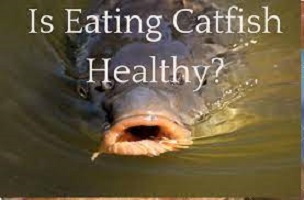Is Catfish Healthy? Nutrients, Benefits, and More
Is Catfish healthy? Nutrients, Benefits, and More

Eating Catfish Healthy? Is Catfish Good for You
It could be good or bad depending on the rate of consumption.
Catfish is a good choice no matter what stage of life you’re in.
In contrast to other commonly available fish; catfish is completely safe for pregnant or breastfeeding women to consume because it contains essential nutrients that the child can benefit from as well.
Grouper, tuna, shark, and swordfish are all fish to avoid or limit while pregnant.
Hot Topics on Catfish >>>>
- What Does Catfish Taste Like? Wild Vs Farmed
- Baked Catfish in the Oven: A Healthy Low-Carb Recipe
- Mackerel (Scombridae) Health Benefits and Side Effects
- Is Catfish Good For Weight Loss? Health Benefits
What is Catfish?
Catfish (Claria gariepinus) is a ray-finned freshwater fish. Farm-raised fish is widely available. This fish has naked scales and barbels or whiskers that give it a distinct appearance.
Catfish are white and can live in both fresh and saltwater. While you may associate catfish with Creole and Cajun cuisine, there are thousands of different types of catfish that are prepared in a variety of ways.
These fish are high in vitamins, minerals, and omega fatty acids.
Popular Catfish Recipes
Catfish is commonly and traditionally cooked by frying. However, if you want to limit your fat intake, you can grill, bake, or broil the catfish.
Cooking catfish over dry heat is the healthiest method. For a healthier catfish preparation, use monounsaturated or polyunsaturated oils such as canola or olive oil, as well as low-sodium seasonings.
To make a wholesome nutritious meal, serve the catfish preparation as a side dish with brown rice or couscous, steamed vegetables, and salad.
Here are a few recipes for you to try out:
- Lime Broiled Catfish
- Cornmeal Catfish
- Catfish is common in Mohinga, a traditional noodle fish soup in Myanmar made with lemon grass, ginger, garlic, pepper, banana steam, onions, and other regional ingredients.
- Nigerians make use of catfish in a variety of stews. Its delicacy “Catfish Pepper Soup,” is popular throughout the country.
Is Farm-Raised Catfish Good For You? Can Wild Catfish Be Good For You? Is Catfish Healthy?
Catfish is available in two varieties:
- Catfish from the wild
- Catfish from a farm
While both types of catfish are nutritious, wild-caught catfish have a few advantages. Wild catfish are healthier than farmed catfish. For starters, it has much higher levels of vitamin D.
Research shows that farmed fish have low vitamin D levels when compared to wild counterparts while farmed catfish provide:
- Contains 25% more calories than wild catfish
- Low levels of omega-3 fatty acids
- Omega-6 levels are higher.
Nutritional Value of Catfish
This popular fish has an excellent nutritional profile. A 3.5-ounce (100-gram) serving of fresh catfish contains the following nutrients:
- Calories: 105
- Protein: 18 grams
- Fat: 2.9 grams
- Sodium: 50 mg
- Vitamin B12: 121% of the Daily Value (DV)
- Selenium: 26% of the DV
- Phosphorus: 24% of the DV
- Cholesterol: 24% of the DV
- Thiamine: 15% of the DV
- Potassium: 19% of the DV
- Omega-3 fatty acids: 237 mg
- Omega-6 fatty acids: 337 mg
Is Catfish Healthy? Catfish Benefits and Side Effects
Incorporating nutritious catfish into your diet helps you meet your protein requirements while also increasing your intake of vitamins, healthy fats, and fatty acids.
However, because catfish contains a lot of oil, health professionals say it can cause heart disease and even stroke. The following is a list of catfish’s health benefits and side effects.
Is Catfish Healthy? Health benefits of Catfish
Consider catfish in your meal planning regularly; it’s tasty, versatile, and, best of all, it’s healthy.
Here are some compelling reasons to include more seafood in your diet:
Excellent for your heart: seafood is low in saturated fat and high in omega-3, both of which can protect the heart from disease and lower blood cholesterol levels. According to one study, eating an extra portion of fish every week can cut the risk of heart disease in half.
Cleaning the vessels: The omega-3 oils EPA and DHA found in seafood help to keep your body from producing eicosanoids, a hormone-like substance that can increase your risk of blood clots and inflammation.
Aids in Weight Loss: Catfish is a food that you should not avoid when dieting because it contains carbohydrates and very little fat catfish.
It has a much lower fat content than other animal side dishes like beef and chicken.
Skin Health Benefits: Not only does omega-3 protect the skin from the damaging effects of UV rays, but it can also help with the symptoms of skin conditions such as eczema and psoriasis.
Fish is also high in protein, which is an essential component of collagen, a substance that keeps the skin firm and flexible.
Combats Depression: seafood may aid in the prevention of Seasonal Affective Disorder (SAD) and postpartum depression.
Studies have found links between low omega-3 levels and an increased risk of depression.
Digestive wellness: A diet high in fish oils may help to protect us from serious inflammatory bowel diseases (BD), such as Crohn’s disease and ulcerative colitis.
There is also evidence that omega-3 fatty acids may help to slow the progression of inflammatory bowel disease in some patients.
Increase your mental capacity: The human brain is nearly 60% fat, with omega-3 fat accounting for the majority of this.
Studies have shown that people who consume a lot of seafood are less likely to develop dementia and memory problems later in life.
Other benefits of Catfish Benefits include:
- Catfish meat is a good source of vitamin B12 for the healthy neurological or nervous system in the body.
- Catfish contain a lot of protein, which can be used to get energy and build muscle tissue.
- The omega-3 in Catfish helps in preventing Osteoarthritis.
- Eating oil-rich fish regularly can help to keep the eyes healthy and bright.
- Eating a lot of fish can keep your lungs stronger and healthier as you age.
- Excellent for Bone and tooth development
- High in Vitamin D
- Acts as an Immune System Stimulant
- Anemia prevention and treatment
Side Effects of Catfish
Catfish has loads of benefits. It also has some potential side effects. Its side effects are listed below:
Catfish contains contaminants: Toxins and harmful trace metals can be easily absorbed by fish and seafood from their habitat waters. These contaminants can enter your system after you eat them, potentially causing toxicities.
Catfish Allergy: While catfish allergies are still uncommon, you should avoid excessive consumption and be aware of any symptoms of an allergic reaction following consumption, skin contact, or inhalation of catfish fumes while cooking.
Mercury poisoning: catfish caught in contaminated water are the primary cause. Catfish and other shellfish may contain methylmercury, which has been linked to methylmercury poisoning in humans.
This poison is extremely toxic and can harm both the central and peripheral nervous systems.
Is Catfish Healthy? FAQS
Why is catfish not good for you to eat? Is fried catfish good for you?
Catfish have a very low amount of mercury, which is very toxic to the human body and can damage the nervous system when consumed in large quantities.
Is catfish a dirty fish?
Farmed catfish, according to the Texas Agricultural Extension Service, is a clean and safe protein source.
Farmed catfish have a consistently mild flavor, as opposed to the sometimes muddy taste of fresh-caught catfish. Catfish can easily be substituted for other fish, meat, or poultry in recipes.
Which is better for you tilapia or catfish?
Tilapia is another viable option for leaner seafood options, but it contains fewer omega-3s than catfish. Furthermore, catfish is a good choice no matter what stage of life you’re in.
How often can you eat catfish? Is eating catfish good for you?
Twice to three times per week
According to the FDA, fish, and shellfish in this category, such as salmon, catfish, tilapia, lobster, and scallops, are safe to eat two to three times per week or 8 to 12 ounces per week.
Are catfish toxic to eat?
Yes, eating catfish is safe. The only time catfish should not be eaten is when it is raw.
Catfish is low in calories and high in nutrients like omega-3 fatty acids and vitamin B12. Including baked or broiled catfish in your regular diet can help you maintain good health.
Is catfish good for arthritis to eat?
Fish high in omega-3 fats include salmon, mackerel, and tuna. Cold-water fish may alleviate rheumatoid arthritis pain.
some fish, such as tilapia and catfish, contain high levels of omega-6 fatty acids, which may promote inflammation.
Is catfish anti-inflammatory?
Catfish has several health benefits. It is low in healthy fats, high in anti-inflammatory omega 3s, and high in protein. Catfish are also high in essential nutrients that our bodies require to function.
Is catfish high in cholesterol?
Fish are a healthy option for lean protein and although catfish are high in cholesterol, they contain polyunsaturated fatty acids that have a cholesterol-lowering effect. A healthy cholesterol level is below 200 milligrams per deciliter.
Is fried catfish good for you?
Fish is a good source of lean protein, and while catfish is high in cholesterol, it also contains polyunsaturated fatty acids, which lower cholesterol. A normal cholesterol level is less than 200 milligrams per deciliter.
Is catfish good for cholesterol?
The omega-3 fatty acids help to lower the concentration of bad cholesterol in the bloodstream while increasing the concentration of good cholesterol.
Is catfish good for weight loss?
Catfish may help with weight loss by increasing feelings of fullness. This fish is also a good choice for people who want to limit their calorie intake while still getting enough nutrients.
Is catfish good for high blood pressure?
Catfish is a lean protein with few calories. It contains omega-3 fatty acids, which help lower blood pressure, reduce inflammation, lower certain cancer risk factors, and keep your mind sharp.
Are farm-raised catfish good for you?
Stick to farm-raised domestic catfish. It’s frequently responsibly farmed and abundant, making it one of the best fish to eat.
Is baked catfish good for you?
Although deep frying adds far more calories and fat than dry heat cooking methods such as baking or broiling, it can be a healthy addition to any meal.
Is eating catfish good for you?
Catfish is high in protein, healthy fats, vitamins, and minerals while being low in calories and sodium.
Catfish is low-calorie, high-protein seafood rich in nutrients such as vitamin B12, selenium, and omega-3 and omega-6 fatty acids.
Is catfish oil good for you?
Fish, in general, contain oil, but catfish have oil in their skin. That’s why it’s so oily and unhealthy.
It also contains a lot of polyunsaturated fat, which not only makes you fat but also accumulates in your bloodstream.
Is blackened catfish good for you?
Yes! Zero Carbs and 160 calories.
You wouldn’t expect something this tasty to be so healthy.
Is catfish fillet good for you?
1 fillet of Fried Floured or Breaded Catfish has 180 calories. The% Daily Value (DV) of a nutrient in a serving of food indicates how much it contributes to a daily diet.
Is catfish nuggets good for you?
Yes. They are high in complete protein, low in calories, and a great source of ultra-healthy omega-3 fatty acids such as fish.
They are also high in vitamin B12, which is essential for preventing heart disease and maintaining a healthy metabolism.
Is catfish good or bad for you?
It depends on how much you eat it.
Catfish is high in lean protein, healthy fats, vitamins, and minerals while being low in calories. It’s high in heart-healthy omega-3 fats and vitamin B12.
Is catfish good for your kidneys?
Cod, flounder, halibut, whitefish, catfish, salmon, tuna steaks, and shrimp are all good kidney diet options.
Is catfish good for your skin?
Catfish is high in lean protein, healthy fats, vitamins, and minerals while being low in calories. It’s high in heart-healthy omega-3 fats and vitamin B12 which are beneficial to the skin.
Is catfish good for your cholesterol?
The omega-3 fatty acids help to lower the concentration of bad cholesterol in the bloodstream while increasing the concentration of good cholesterol.
Is catfish good for your liver?
Seafood consumption is generally safe for patients with liver diseases.
Is catfish good for your eyes?
Regular consumption of fatty fish is widely thought to be beneficial to vision. The same cannot be said for fish eyes.
Is grilled catfish good for you?
Deep frying adds far more calories and fat than dry heat cooking methods such as baking or broiling, it can be a healthy addition to any meal.
Is freshwater catfish good for you?
Catfish is high in protein and healthy fats, but it also contains a lot of essential vitamins like B-12 and selenium, which are usually only available in larger amounts through supplements.
Is breaded catfish good for you?
1 fillet of Fried Floured or Breaded Catfish has 180 calories. The% Daily Value (DV) of a nutrient in a serving of food indicates how much it contributes to a daily diet.
Is cajun catfish good for you?
Catfish is high in protein and healthy fats, but it also contains a lot of essential vitamins like B-12 and selenium, which are usually only available in larger amounts through supplements.
Is catfish good for you while pregnant?
Catfish, as a low-mercury choice, can be built-in in into any pregnancy or breastfeeding diet. As a lean fish, it’s an outstanding source of protein.
It is little in saturated fat (the bad kind) and is a modest source of polyunsaturated fat (the good kind) and omega-3 fatty acids
Conclusion
Overall, catfish is a healthy fish with numerous benefits. Despite its low-fat content, it is high in omega-3 fatty acids and contains significant amounts of vitamin D, selenium, and B12.
Among the other readily available seafood options, catfish is one of the most versatile options you can incorporate into your home meal rotations.
Disadvantages of eating catfish ~ what are the side effects of eating catfish?
Stroke and heart attack are some of the results. Excessive eating of catfish, high in Omega-6 fat, may raise the risk of hypertension, heart attack, and stroke.
Is catfish healthy for weight loss ~ is catfish good for you to lose weight?
Low in calories
Catfish is a good weight-loss food since a 100-gram piece provides 98 calories. In most recipes, it may replace fowl and other higher-calorie meats.
Can high-blood-pressure patients eat catfish?
Low-calorie, catfish is lean protein. Omega-3 fatty acids lower blood pressure, inflammation, and cancer risk factors, and sharpen the intellect.
Catfish for pregnant women? Is catfish good for a pregnant woman?
Eat 8–12 ounces of mercury-free seafood such as shrimp, salmon, pollock, catfish, and canned light tuna every week throughout pregnancy. Albacore (white) tuna may be eaten 6 ounces per week.
Catfish for diabetics? Is catfish good for diabetics?
Omega-3 fatty acids in fish support heart health.
Is catfish good or bad for you? Is catfish good for you?
Catfish has minimal calories, lean protein, healthy fats, vitamins, and minerals. It’s high in vitamin B12 and heart-healthy omega-3 fats.
Deep-frying adds more calories and fat than baking or broiling, yet it may be a nutritious complement to any meal.
Is catfish healthy for liver ~ is catfish liver safe to eat?
Fish livers are discarded by the fishing industry, but a team of researchers found that they contain polyunsaturated fatty acids, which are healthy.
Catfish Benefits and side effects
Catfish has minimal calories, lean protein, healthy fats, vitamins, and minerals. It’s high in vitamin B12 and heart-healthy omega-3 fats.
Deep-frying adds more calories and fat than baking or broiling
Is farm-raised catfish healthy?
Healthy catfish meals are low in fat and rich in protein. The healthiest, most flexible, and most sustainable fish shops and fish restaurants are US-raised catfish.
Is catfish good for cholesterol?
Catfish Benefits
It’s high in omega-3 and omega-6 fats, which lower harmful cholesterol. Omega-3 lowers inflammation and protects the heart and circulatory system.
Is fried catfish good for you?
Catfish has minimal calories, lean protein, healthy fats, vitamins, and minerals. It’s high in vitamin B12 and heart-healthy omega-3 fats.
Deep-frying adds more calories and fat than baking or broiling, yet it may be a nutritious complement to any meal.
Is catfish healthy food to eat?
Catfish has protein, healthy fats, vitamins, and minerals and is low in calories and salt.
Catfish is low-calorie, high-protein, and rich in vitamin B12, selenium, omega-3, and omega-6 fatty acids.


